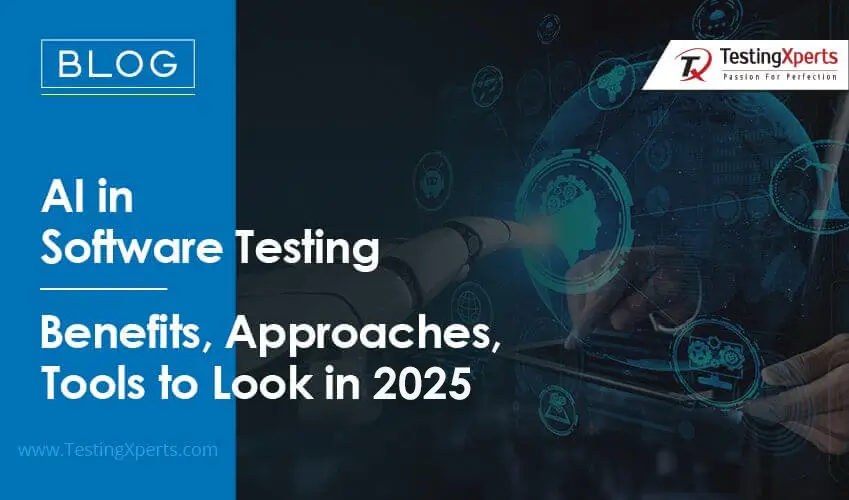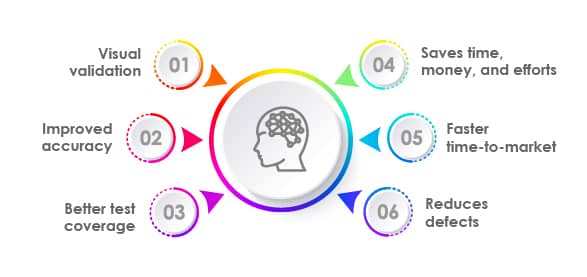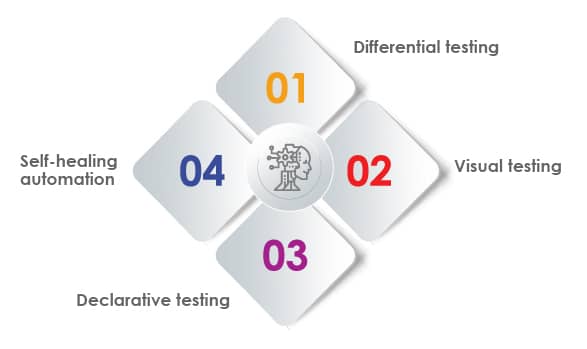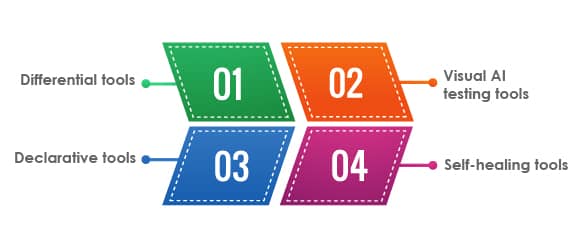Recommended Blogs
AI in Software Testing – Benefits, Approaches, Tools to Look in 2025

Table of Contents
- What is AI-based Testing?
- How has AI evolved in software testing?
- Some of the benefits of leveraging AI in software testing
- What are the 4 key AI-driven testing approaches?
- What are the 4 main categories of AI-driven testing tools?
- Conclusion
Artificial Intelligence (AI) is the latest technology to be leveraged across all industries and domains. AI continues to make its way into domains previously reserved for human skills and has been enabling significantly dominant results. On a similar note, AI is being leveraged in the field of software testing also to ease the automation testing process and deliver more quality outcomes.
According to Grand View Research, the market size for AI-enabled testing was valued at approximately USD 196.63 billion in 2023, which is expected to expand at a compound annual growth rate (CAGR) of 36.6% from 2024 to 2030.
Typically, the application of AI in software testing will make the entire testing process faster, clearer, easier, and budgeted. Therefore, AI-based testing will provide a strategic platform where software testers can leverage AI and take the testing process to a new level and thus deliver more quality results to businesses.
Test automation tools have been supporting the continuous testing process for many years. But, now the need for more effective tools and techniques such as embedding AI in software and QA testing has become a mandate for delivering quality software and for ensuring superior customer experience.
What is AI-based Testing?
AI-based testing is a software testing technique in which AI and Machine Learning (ML) algorithms are used to effectively test a software product. The objective of AI-based testing is to make the testing process smarter and highly effective. With the inclusion of AI and ML in testing, logical reasoning and problem-solving methods can be applied to improve the overall testing process. Further, in this testing method, AI testing tools are used to execute the tests that use data and algorithms to design and perform the tests without any human intervention.
How has AI evolved in software testing?
The paradigm of software testing has evolved significantly over the past two decades. Right from manual testing to automation testing, where selenium is considered to be one of the finest test automation tools, the testing journey has been quite encouraging. However, in today’s fast-paced IT world, the domain of software testing has to come up with innovative and well-researched testing methodologies. For this purpose, the dawn of AI-based testing has come up and has been proving very impactful.
AI algorithms can completely mimic human intelligence, and ML allows computers to learn automatically without any human intervention. Interestingly, AI and ML involve the development of unique and specific algorithms that can access data, learn from that data by extracting patterns to make decisions, and these predictions are to be used in software testing effectively.
Moreover, enterprises are rushing towards tools that can leverage AI and ML algorithms and can be used for testing the software effectively. It has also been seen that businesses get many benefits from AI-based testing as it will enable faster and continuous testing, complete automation without any human intervention, and also enables quicker ROI.
Some of the benefits of leveraging AI in software testing

Visual validation –
AI has pattern recognition and image recognition capabilities that together help to detect visual bugs by performing visual testing on applications. It helps to make sure that all the visual elements are engaging and can function properly. AI can recognize dynamic UI controls irrespective of their size, shape and analyses them at a pixel level.
Improved accuracy –
In the manual testing method, the chances of human-prone errors are high, especially in situations of repetitive tasks. Automation testing helps in removing these human-prone errors. But, with the advent of AI in automation testing, repetitive tasks are handled more effectively and the results are recorded more accurately. Thus, AI helps in removing the minute chances of errors and improves the overall accuracy of tests.
Better test coverage –
AI in testing increases the test coverage as it can check the file contents, data tables, memories, and internal program states seamlessly. It also helps to determine if the program works as expected and delivers effective test coverage.
Saves time, money, and efforts –
Software tests need to be repeated whenever there is an instance of change being made in the source code. Manually this becomes time-consuming and takes a lot of effort from testers. But, with AI-driven tests, repetitive tasks are handled properly, quickly, and efficiently.
Faster time-to-market –
AI-driven tests support continuous testing, and thus products are released faster which helps businesses go early-to-market.
Reduces defects –
AI in testing helps in early and fast bug identification, which ultimately reduces the defects and makes the product bug-free, and reliable for end-users.
What are the 4 key AI-driven testing approaches?

Differential testing – Differences are classified and application versions over each build are compared in this type of testing.
Visual testing – Visual testing is a software testing technique in which the look and feel of an application are tested by leveraging image-based learning and screen comparisons.
Declarative testing – It aims at specifying the intent of the test in a natural or domain-specific language. The system decides how to perform the test
Self-healing automation –Element selection in tests is auto-corrected when the UI changes.
What are the 4 main categories of AI-driven testing tools?

Differential tools
These tools leverage AI and ML algorithms to identify code-related issues, security vulnerabilities, regressions, etc. This is achieved through code scanning, unit test automation, etc. Some of the tools under this category are:
1. Launchable:
Launchable is based on an ML algorithm that predicts the likelihood of failure for each test based on past runs and whenever the source code changes under test. This tool lets the user record the test suite so that tests that are likely to fail are run first. One can choose this tool to run a dynamic subset of tests that are likely to fail, thereby reducing a long-running test suite to a few minutes.
2. Google OSS-Fuzz:
It is a fuzz testing tool that aims to make common open-source software more secure, stable, and reliable. This tool combines modern fuzzing techniques with scalable, and distributed execution. This tool supports C/C++, Rust, Go, and Python code
Visual AI testing tools
With the ever-growing number of platforms that vary in screen sizes and have different configurations, it has become a tedious task for test engineers and developers to effectively test the UI layer. Also, the UI layer experiences constant changes from time-to-time as businesses wish to provide a better user experience. Therefore, today there is a dire need for visual AI testing tools that effectively test all variations of these UI layers. Some of the tools that fall under this category are:
1. Applitools:
This is an AI-powered visual testing and monitoring platform. This has been named a next-generation test automation platform powered by Visual AI. The major features include Applitools Eyes which helps to increase test coverage and reduce maintenance. The Ultrafast grid helps with cross-browser and cross-device testing and accelerates functional and visual testing by 30 times. This Applitools platform integrates with all modern test frameworks and works with many existing testing tools like Selenium, Appium, Cypress, etc.
2. Percy by BrowserStack:
It is an all-in-one visual review platform that comes with amazing features such as pixel-by-pixel diffs, responsive diffs, and snapshot stabilization. This tool allows cross-browser rendering, high-speed rendering, and has parallelization capabilities. Percy helps teams automate visual testing. This Browserstack tool is used to typically capture screenshots and compare them against the baselines and display visual changes. It increases the visual coverage and helps teams to deploy code changes with confidence.
Declarative tools
These tools aim to enhance test automation productivity and stability. These tools leverage AI and ML and have significant abilities related to Robotic Process Automation ( RPA), Natural Language Processing (NLP), Model-based Test Automation (MBTA), and Autonomous Testing Methods (AT). The main aim of these methods is to eliminate tedious, error-prone, repetitive tasks through smart automation. Some of the tools that fall under this category are:
1. Tricentis:
This is an AI-driven, next-gen automation testing tool that allows Agile and DevOps teams to rapidly achieve test automation goals. It allows teams to go beyond continuous testing with AI. It allows automating end-to-end testing of software applications. This tool combines multiple aspects of software testing (test case design, test automation, test data design and generation, and analytics) to test GUIs and APIs from a business perspective.
2. UiPath Test Suite:
This is the latest Test Suite that can be used to automate and centralize the testing process and helps to launch resilient robots and ensures high-quality of every automation. The UiPath Test Suite consists of UiPath Studio Pro, UiPath Test Manager, and UiPath Orchestrator. Thus, UiPath test Suite can be used to automate tests in UiPath Studio Pro with drag and drop interfaces, helps to manage tests with UiPath Test Manager, and also helps to execute tests witn UiPath Orchestrator. Therefore, UiPath Test Suite is helping businesses with a 360 degree testing and is helping RPA developers to build more, test better, and fix never.
Self-healing tools
In automation tests, the problem of flakiness, reliability, and maintenance issues persist, and this is one of the main reasons why AI and ML have been introduced in test automation. To overcome these problems, self-healing tools have been developed that are mostly based on a record and playback mechanism, wherein the main ML engine resides in the self-healing of the recorded scripts. Some of the tools that fall under this category are:
1. Mabl:
It is the leading intelligent test automation platform built for CI/CD. Mabl crawls your app screens and begins to run default tests that are common for most applications. It also uses ML algorithms to improve test execution and defect detection.
2. Testim:
This tool uses AI and ML algorithms to automate testing to its full extent. AI is used to speed up the authoring, execution, and maintenance of the tests. Testim includes self-maintenance of automated tests that are ML-based. This results in the fast authoring of stable automated tests.
Conclusion
Today as technology is advancing, more and more businesses are adopting agile and DevOps practices. But, with the adoption of these methodologies, the need for robust tools that support continuous testing and continuous release are also rising. This is where AI-based test automation tools come into the picture. With the advent of AI in software testing, businesses are now able to achieve faster tests and reliable products.
AI-driven test automation tools not only support DevOps practices but also bring in human-like decision-making abilities which ultimately helps in releasing high-quality software in less time. Leverage next-gen AI-based testing services by next-gen testing services provider to get faster and quality releases with more efficiency and accuracy.
FAQs
AI in software testing has advanced from simple automation to intelligent test generation, self-healing scripts, and predictive analytics, improving efficiency and accuracy in identifying defects.
AI-driven testing includes autonomous test generation, visual testing, predictive analytics, self-healing test scripts, and anomaly detection to optimize software quality.
AI enhances test accuracy, reduces manual effort, accelerates test execution, improves defect detection, and optimizes test coverage, leading to higher software reliability.
AI will drive continuous testing, autonomous test maintenance, intelligent defect prediction, and enhanced test coverage, making software quality assurance more efficient and adaptive.
Challenges include high implementation costs, skill gaps, test data dependency, integration complexities, and the need for continuous model training for accurate testing results.
Discover more
